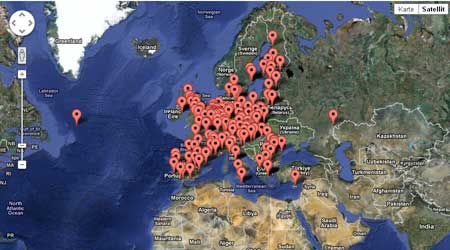|
Education & Training
 Switzerland Switzerland

Overview with the universities
EHRO-N University Locator

Universities
Bachelor
-
Bachelor of Sciences at University of Geneva
The first two years of physics studies at university contain a lot of mathematics. This is because mathematics is the most important tool for physicists: to show the true character of natural phenomena, from the infinitely small to infinitely large. In the third year students have the courses of particles and nuclear physics.
Master of sciences in nuclear and particle physics
The Master of Science in Physics is earned with a combination of theory courses, practical work and tutorials.
-
Master’s programme in Nuclear Engineering at École Polytechnique Fédérale de Lausanne and Swiss Federal Institute of Technology Zurich.
The Nuclear Engineering (NE) Master's program confers the title "Master of Science EPF-ETH in Nuclear Engineering”
Scope of teaching
Neutron and reactor physics including experiments on a nuclear teaching reactor
Power plant technology and safety, novel reactor concepts
Innovative materials and nuclear fuels
Nuclear power as integral part of a sustainable energy supply
Fusion technology
Non-energetic nuclear applications in medicine and technology
Source
Master in Nuclear Engineering at the Swiss Federal Institute of Technology Zurich
-
Master of Science in Chemistry and Molecular Sciences at Bern University
The programs are targeted to acquire an understanding of the topical questions of chemical, biochemical and material chemistry research, to realize problems and to know experimental methods for solving them.
Courses of Nuclear/Radiochemistry
-
Master of Physics at University Basel
Nuclear, Particle and Astrophysics Seminar
Topics for Masters Project and Theses of Nuclear Reactor Physics and Neutrons
Reactor physics: in connection with the Swiss nuclear reactor school, we are developing experiments, to be performed with the reactor at our Institute, suitable for the practical training of reactor operators. We are investigating, among many topics, neutron diffusion, energy distribution of emitted neutrons, role of materials involved etc.
Education and Training Programmes in the Ions Radiation
Courses for students on Trainings Reactor
-
Courses of Radioactive Waste at School of Underground Waste Storage and Disposal, Baden-Doertwill
Situated in the heart of Switzerland the ITC provides both theoretical and practical training and research in all aspects of science, engineering, decision-making and communication concerned with underground waste management and related environmental issues.
Doctoral Programme of the Nuclear Physics at the European Graduate School “Handrons in Vacuum, in Nuclei and Stars” at university of Basel, Tuebingen and Graz
The main focus of the Doctoral Program "Hadrons in Vacuum, Nuclei and Stars" is a deeper understanding of Quantum Chromodynamics and the properties of hadrons.
The Doctoral Program focuses on theoretical investigations whereas the partner Universities in Basel and in Tübingen contribute also to experimental hadron and astroparticle physics research. This close contact to the experimental hadron physics will have direct impact on the theoretical research in Graz. The Doctoral program has the following scientific long-term goals:
-
structure of the QCD vacuum, axial anomaly
-
confinement scenarios
-
mechanism of dynamical chiral symmetry breaking and generation of hadronic masses
-
structure of the nucleon
-
exotic hadrons like e.g. glueballs and hybrids
-
excitation spectrum of hadrons and properties of excited hadrons
-
role of strange quarks in vacuum and hadron structure
-
exclusive hadronic reations
-
temperature and density dependence of hadron properties
It is planned to combine different methods (analytical and computational, perturbative and non-perturbative) for the theoretical investigations in order to improve the quality of available theoretical techniques.
|
|
